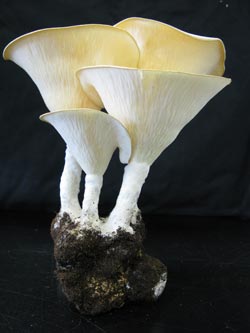Preparation of anti-tumor nanoparticles using tiger milk mushroom

A polysaccharide-protein complex was found in Tiger Milk mushrooms from Africa, which can turn selenium into new cancer treatment<br><br>Copyright : Hong Kong Polytechnic University<br>
Cancer is a word dreaded by many. Many cancers are deadly and difficult to treat while conventional remedies such as chemotherapy often cause physical and emotional sides effects, giving struggling patients more harm just as the cancer. What if cancer-killing drugs can become more natural and in harmony with our body?
Tapping into the power of natural ingredients for safer treatment is the next frontier in the battle against cancer. A recent breakthrough from PolyU’s Department of Applied Biology and Chemical Technology using tiger milk mushroom to prepare anti-tumor nanoparticles is bringing us one step closer.
A natural compound found in mushrooms may hold the key to a new class of cancer drugs. In Tiger Milk mushrooms from Africa, Dr Wong Ka-hing, Associate Director of the Food Safety and Technology Research Centre, has discovered a polysaccharide-protein complex (PSP) which can turn selenium, a common nutrient, into new cancer therapy to benefit millions of breast cancer patients around the world.
Selenium is a trace mineral essential for good health. Health benefits include boosting immune systems against viral infections. Staple foods and vegetables in our diet such as rice, wheat, potatoes, broccolis and onions are great sources of antioxidant. In nano-size, selenium was found to have potent anti-cancer effect in the laboratory. However, efficacy diminished as the nanoparticles fell back into bigger aggregates which suppressed the up-take into cancer cells. Finding new ways or compounds to halt the rebinding process is harder than it seems. Literally, it is quite like searching for a needle in a haystack.
The use of mushroom PSP as stabilizing force is a significant breakthrough. Combined with cutting-edge nanotechnology, Dr Wong and his team successfully made selenium nanoparticles to destroy breast cancer cells. “Lab-test results were exciting. Our selenium nanoparticles were found to have remarkable inhibition effect on the growth of human breast cancer cells by triggering the cells into self-destruction. The next stage will be tests on animals,” Dr Wong said.
The research is still in a very early phase. But if successful, it could lead to a new drug much less toxic and more reliable, capable of killing cancer cells while leaving healthy tissues unharmed, which could mean fewer agonizing side-effects, greater comfort and better chances of recovery. Dr Wong also planned on developing a dietary supplement as auxiliary cancer treatments.
Scientists around the world have been looking into the therapeutic value of produces such as fish oil, broccoli, cauliflower, cabbage, and green tea. For safe human consumption, a natural ingredient must be effective against cancer in low concentration. Dr Wong’s work has advanced medicine with a working tool for boosting the effectiveness of natural cancer killing compounds.
“Mushroom PSP has striking effects on controlling selenium nanoparticles,” Dr. Wong added, “and a better understanding of this mechanism may help us find the next suitable compounds and make better nano-medicines for a whole host of cancers.” Tiger Milk, similar to Chinese mushrooms we have in dishes and soups mushroom, is a common foodstuff in Africa, and the groundbreaking biomedical research opens door to making cancer drug from 100% natural ingredients. The drug development process is equally natural and green because all it takes are room temperature and water, which is little waste and without much power consumption.
Holding new promise for beating cancer, this research has won Dr Wong the Young Investigator Award at the 2011 International Conference of Food Factors and the Gold Medal in 40th International Exhibition of Inventions of Geneva. These prestigious awards were at the same time an endorsement to the long-running commitment from the University to the discovery and development of ingredients for the betterment of the community.
Media Contact
All latest news from the category: Life Sciences and Chemistry
Articles and reports from the Life Sciences and chemistry area deal with applied and basic research into modern biology, chemistry and human medicine.
Valuable information can be found on a range of life sciences fields including bacteriology, biochemistry, bionics, bioinformatics, biophysics, biotechnology, genetics, geobotany, human biology, marine biology, microbiology, molecular biology, cellular biology, zoology, bioinorganic chemistry, microchemistry and environmental chemistry.
Newest articles

Superradiant atoms could push the boundaries of how precisely time can be measured
Superradiant atoms can help us measure time more precisely than ever. In a new study, researchers from the University of Copenhagen present a new method for measuring the time interval,…

Ion thermoelectric conversion devices for near room temperature
The electrode sheet of the thermoelectric device consists of ionic hydrogel, which is sandwiched between the electrodes to form, and the Prussian blue on the electrode undergoes a redox reaction…

Zap Energy achieves 37-million-degree temperatures in a compact device
New publication reports record electron temperatures for a small-scale, sheared-flow-stabilized Z-pinch fusion device. In the nine decades since humans first produced fusion reactions, only a few fusion technologies have demonstrated…





















